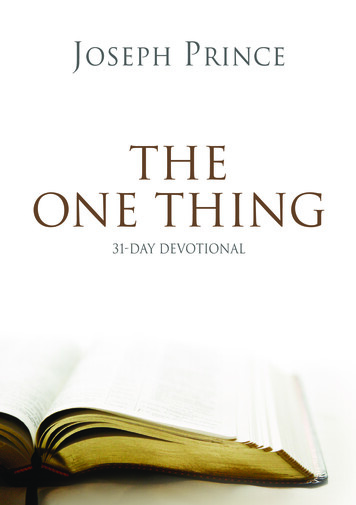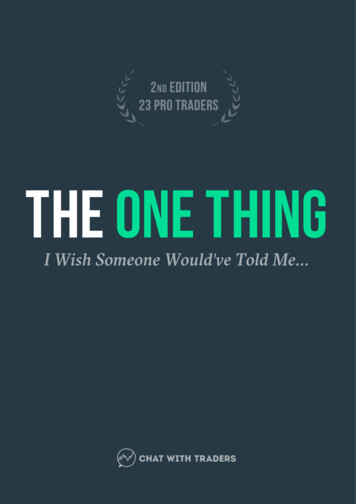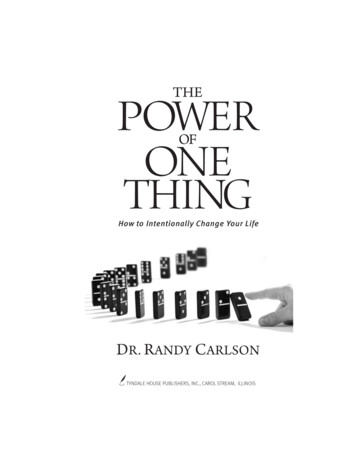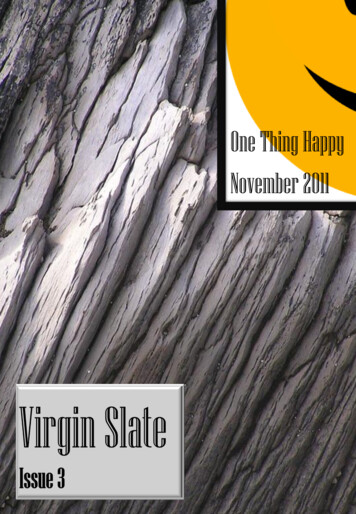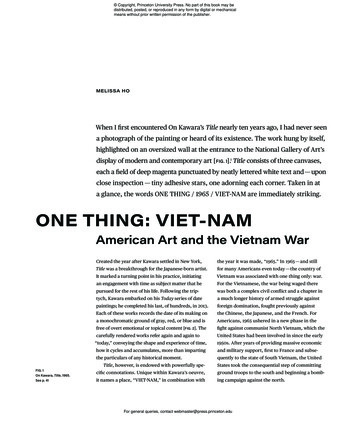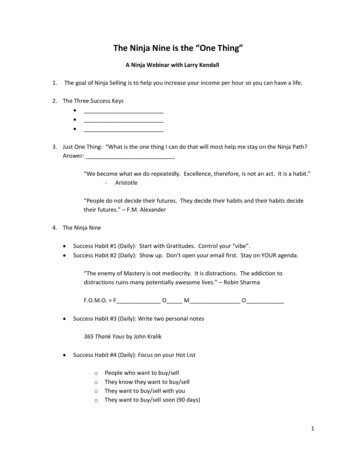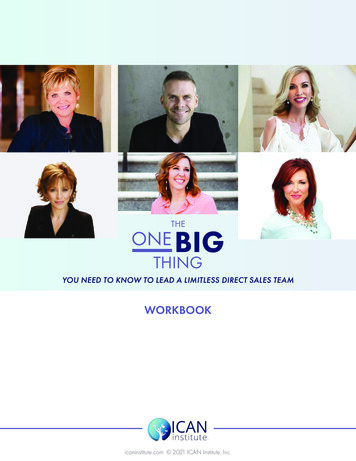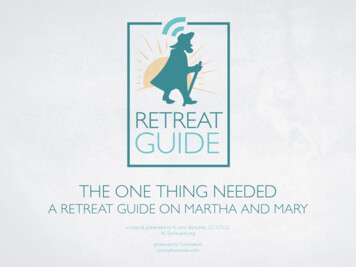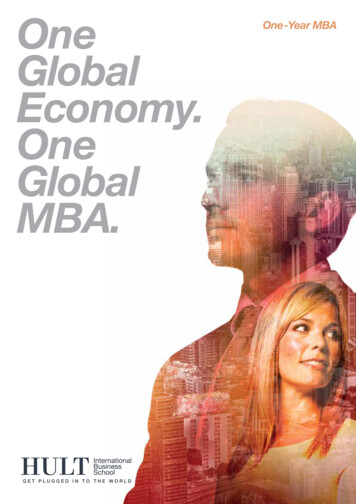
Transcription
Case StudiesSummaryApproach to Human Learning Systems:Human: Support public service leaders,putting humans at the heart of leadershipand of relationshipsLearning: Achieve practices of collectiveleadership within and across publicservicesSystems: Systems work best when theywork together to address challengingproblemsOne Thing at a Time IntroductionCollective Leadership for Scotland (hereafter, CLfS)launched in January 2018. As part of the outwardfacing Scottish Government, this work focuses uponsupporting public services in how they lead andwork together through direct facilitation of workwith groups of leaders to tackle complex, systemicissues in real time, designed programmes, events,learning festivals and network building. Central tothis work is a belief that change does not happen ina silo but requires working across organisations andcommunities to deal with intractable problems,varying from joining up children’s services, to placebased work, to tackling violence against women.The impetus for joined up ways of working hadbeen around for a number of years with theStrategic Objectives for Scotland in 2007 whichintroduced the notion of outcomes nationally, theChristie Commission (2011), a Scottish Governmentreport on the future delivery of public services,highlighting to need to work collectively, and thenew revised National Performance Framework(NPF). The purpose of the framework is to: create a more successful countrygive opportunities to all people living inScotlandincrease the wellbeing of people living inScotlandcreate sustainable and inclusive growthreduce inequalities and give equalimportance to economic, environmentaland social progressOur values guide the approach, to: treat all our people with kindness, dignityand compassionrespect the rule of lawact in an open and transparent waywww.humanlearning.systems
Case StudiesThe work of CLfS arose from this context and nowreaches across 5,000 people each year, the focusbeing upon working directly with leaders inwhatever guise, those whose decisions and ways ofworking have a direct impact on people andcommunities.Areas of work for CLfS: Direct facilitation of groups working totackle systemic issues – this work can be ofmany months’ durationProviding courses to develop facilitationcapacity within public services to work incomplexityWorkshop eventsProviding practice spaces and resourceswhich support self and group reflectionModelling a culture of collaboration andbuilding strong networks across the publicservice systemProducing and hosting an annual learningfestival for innovation across Scotlandwhich also now includes events in Walesand IrelandThe Human Learning System features of CLfSwork:HumanCLfS aims to support public service leaders, puttinghumans at the heart of leadership and ofrelationships. This approach counters work thatsees leadership invested in the individual or as asingle, hierarchical structure, focusing instead uponco-creating and enacting leadership in response tosystemic social issues which require a collectiveresponse. CLfS supports this through providingleaders with the skills, through bespoke work,which encourages action inquiry to reflect on waysof working (as individuals through 1st personinquiry, and as teams through 2nd and 3rd personinquiry).LearningCLfS’s focus is on achieving practices of collectiveleadership within and across public services.Through embedding research within ways ofworking, CLfS regularly reviews and responding tohow best to achieve this. Alongside gathering dataon key indicators like attendee numbers, sectorsand engagement with resources, CLfS also usesqualitative methods to measure learning, throughquestionnaires, and in-depth individual and groupconversations with partners and selectedparticipants. These methods allow CLfS to gaininsight into people’s stories and experiences, andhow these can be used as evidence, as well as inshaping future approaches to working. Drawingfrom extensive research in collective leadership andaction inquiry, CLfS also reviews publications tosystematically consider what can be learnt fromwider studies and academic literature, as well aswhat CLfS approaches might contribute. Thisincludes through peer-reviewed publications.SystemsCLfS is driven by an approach that considerssystems to work best when they work together.This work is about trying to change the wholesystem, particularly in how organisations worktogether (rather than silo) around challengingproblems. Story of ChangeOn the 23rd March 2020, Scotland moved intolockdown due to the COVID-19 pandemic. Workacross public services shifted and intensified inresponse to the new challenges that thisunprecedented time presented. The key priority ofwork became continuing to keep essential servicesgoing, responding to crises. For those in leadershippositions, this meant an increase in workloads,hours and an intensified pace of working. Throughconversations with public service partners itbecame clear that feelings of exhaustion andoverwhelm were rife. Our challenge became howwe might best support people.www.humanlearning.systems
Case StudiesUsing our established links with partners, wedesigned a programme called ‘One Thing at a Time’.The intention of this was to provide a gentleframework that would cover four themes thatprovided spaces for individual reflection andstillness. The programme was accessed online,offering participants the opportunity to drop in andout at times that fitted them and to participate tothe extent that they were able. It ran over eightweeks, spending two weeks on each of the fourthemes, and with supportive practices like guidedjournaling running alongside.ThemedweekStructureThreeHorizonsSessions and resources on theThree Horizons framework- apractical framework for thinkingabout the future. It offers a wayof envisioning where things are,and where individuals mightwant them to be- inorganisations, and in livesbeyond.Action Inquiry A reading group to work throughaction inquiry as a way ofworkingMindfulnessand “StableMind”*Using the work of MargaretWheatley, and principles ofmindfulness to explore and holdspace for reflection inorganisations (collectively, andindividually).Leading inthe UnknownWorking with Martin KalungaBanda to make space fordiscussions and reflectionsabout what it takes to lead intimes like these.SupportivepracticesIncluding;Thirty minute guided journalingsessions, three times a weekMindful photographyDialogue talks/walksOver 900 people signed up for a total of 26 sessionsover the eight weeks. Some were familiar faces, butothers were new. The space created time and somepractices for self-reflection, and for reflection onroles and priorities within organisations, basedupon what people needed at the time. As oneparticipant (public service leader) explained;“When things are full on, and you’re focusing onkeeping things running, and ensuring thatcolleagues are well, and dealing with crisis, andthat’s before all the things outside of work, it’s easyto forget yourself. I’d been feeling really burnt out,but at the same time, that there wasn’t time to beburnt out so it was a vicious cycle. I nearly didn’tcome to the session, but I’m so glad I did. It gaveme the space to reflect, and to re-align and reenvision what I needed to do to get to where Ineeded to be. I came away feeling more positiveand just lighter. It was this that made me payattention to looking after myself, and that I mattertoo, and that me having this sort of space andreflection isn’t a waste of time but it’s fundamentalto continuing to deliver good services”The focus upon empathy and trust might not havebeen new to many in their leadership approaches,but it offered a space for leaders to be supported,to receive care and the opportunity to slow downfrom frenetic activity. Whilst it is difficult tomeasure the impact, we know from qualitativefeedback that it offered people ways of re-aligningfocus, self-care and that the conversations wereexperienced as being part of a supportivecommunity that they could take back into their ownlives and communities.Working with leaders across systems andorganisations is aided by having strong partnershipsupport. CLfS includes partners in steering groups,and our ongoing work has a wider reputation ofworking successfully to bring key people into thesame room. This means that we benefit from awider collective leadership community who canoffer contributions to our work. This way ofwww.humanlearning.systems
Case Studiesworking also enables us to rapidly check futureplans. Enablers and SuccessesCLfS’s position in the Scottish Government, throughthe recognition that creative approaches areneeded, also provides an environment to developand design responses accordingly with a degree ofautonomy informed by listening to partners.“The focus uponempathy and trust offereda space for leaders to besupported, to receive careand the opportunity to slowdown from frenetic activity.Whilst all CLfS work had previously been face toface, moving conversations online enabled us toreach far wider communities, increasing diversity,connectivity, and opening up possibilities for newpartnerships. We are embedding and seekingfeedback on this. Implementing qualitativeapproaches to accompany the measure of keystatistics offers the possibility of understanding thesuccess and experiences of the programme andwider work from participants. It enables a way ofseeing impact in ways that are not captured usingnumerical data alone.Having well-established relationships and beingcognisant of demands also allowed us to shift ourlearning to offer focused opportunities that wereshort, create spaces to meaningfully connect withone another, have the potential to shiftperspectives and lead to deeper levels ofawareness. Barriers and TensionsHowever, developing a rapid response of an offeralso brought with it challenges. Recognising thatCLfS is also part of the system, this depended onthe different perspectives of staff, and experiencesof the team working together, particularly in theearly stages of the pandemic. This meantcombining work and home responsibilities, as wellas redeployment of some team members. Therewere also initial uncertainties about whether wewould be able to continue with our work, orwhether the team in its entirety would beredeployed to work on other priority areas in thegovernment. Delivering the programme meantrecognising where those working for CLfS were,modelling collective approaches within teams, andworking flexibly to fill in roles and tasks to reduceother’s workloads.The shift from working face-to-face also meantdeveloping entirely new ways of organising andengaging. This meant honestly and openlyacknowledging what was known, and what wasnot.Another uncertainty was an initial hesitation aboutwhether there was an appetite to engage andparticipate in learning activities during crisisresponses. One Thing at a Time therefore workedmuch as an experiment, to assert and assesswhether there was a desire for this kind of offer.Therefore evaluating, working closely withpartners, and measuring responses becameparticularly important, and our already establishedemergent ways of working meant that we couldadapt and respond to these accordingly. What taking an HLSApproach RequiresHumanRecognising demands on those workingacross public services Listening and responding to needs Creating flexible & adaptable space toengage that participants could use in theirown ways. Creating empathy, trust, and safe spacesfor reflectionLearning www.humanlearning.systems
Case StudiesSeeking out the best ways to evaluateprogramme (qualitative & quantitative) Collaborating with partners to explore whatwent well for those running sessions, whatsupport would help, and what could bebetter improved next time. Increasing our skills in virtual events Self-reflection Our comfort with rapid innovationSystems Acknowledging changing systems Working flexibly Being accountable to partners Noticing what was happening in the systemfor people – overwhelm, frenetic activityand responding to provide what the systemmay require to bring some equilibrium CLfS is currently evaluating the programme using newly established research plan. Basedupon the initial findings from this, we are in the process of creating a systematic offer,repeating parts of the sessions which add the greatest value for people andexperimenting with new offers. CLfS is also developing an online presence, developingand growing the global community, and continuing to seek and develop a variety ning.systems
One Thing at a Time therefore worked much as an experiment, to assert and assess whether there was a desire for this kind of offer. Therefore evaluating, working closely with partners, and measuring responses b
